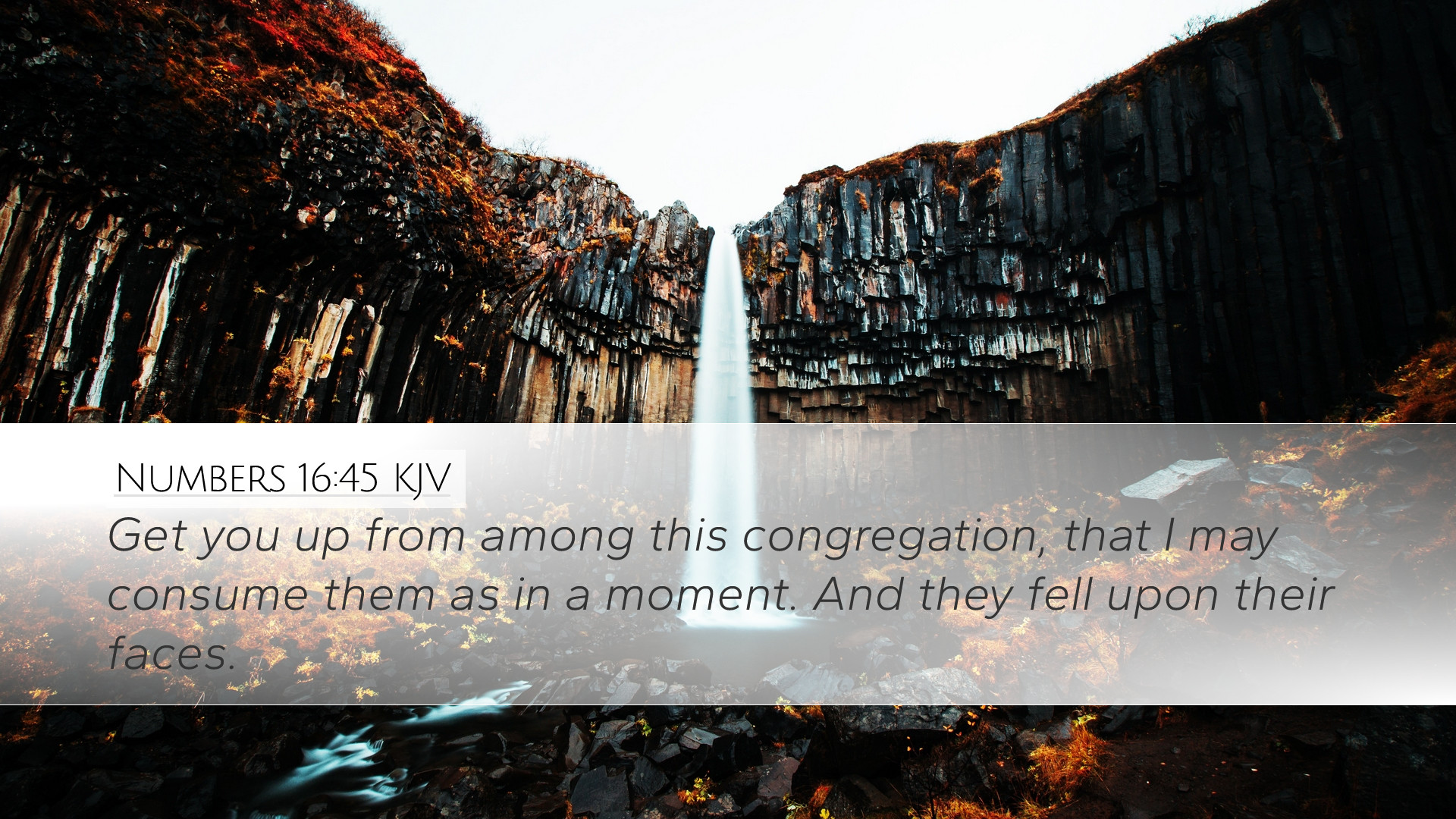Commentary on Numbers 16:45
Verse Reference: Numbers 16:45 - "Get you up from among this congregation, that I may consume them as in a moment. And they fell upon their faces."
Context of Numbers 16
The backdrop of Numbers 16 is the rebellion of Korah, Dathan, and Abiram against Moses and Aaron. This event demonstrates not only the challenges of leadership in Israel but also the persistent discontent among the people. The chapter reflects critical theological themes, such as divine authority, the consequences of rebellion, and the nature of God’s justice.
Insights from Commentaries
Several esteemed theologians have provided valuable insights into this significant passage, shedding light on its implications for modern readers and leaders.
Matthew Henry's Commentary
Matthew Henry emphasizes the gravity of rebellion against divinely appointed authority. He notes that God’s command to separate from the congregation speaks to His judgment and the seriousness of sin. This verse serves as a pivotal moment where God’s wrath is prompted by continual rebellion.
- Divine Authority: Henry insists that disobedience leads to divine judgment, emphasizing that God’s wrath can swiftly bring about destruction.
- Spiritual Separation: The call to "Get you up from among this congregation" highlights the necessity for a spiritual and moral separation from those who choose rebellion against God.
Albert Barnes’ Notes on the Bible
Albert Barnes focuses on the immediacy of God's reaction to the rebellion. He notes that while God extends mercy and grace, there are times when His patience comes to an end, leading to decisive action. Barnes elucidates the stark contrast between God's mercy and His judgment.
- Consequences of Rebellion: Barnes points out that the leaders’ rebellion had collective consequences for the entire congregation, emphasizing communal responsibility in faith.
- Posture of Humility: The falling upon their faces illustrates profound humility and acknowledgment of God’s authority, a crucial posture for believers today.
Adam Clarke's Commentary
Adam Clarke provides a pastoral view of the verse, noting the emotional weight of divine judgment. He suggests that God’s command is not merely punitive but serves as a warning to all those who witness the unfolding events.
- Warning and Mercy: Clarke sees the command as both a warning and a cry for mercy. The invitation for the people to separate themselves also indicates a potential pathway for repentance.
- Significance of Falling on Faces: This act symbolizes a desperate plea for mercy, illustrating the biblical principle that recognition of one's sin leads to a posture of repentance.
Theological Reflection
In addition to the insights of these commentators, this verse invites a deeper theological reflection on the nature of God's authority and response to sin. The separation commanded by God can be seen as a foreshadowing of themes found in the New Testament, where believers are called to live lives distinct from the world.
- Separation from Sin: The command to separate reflects the broader biblical theme of holiness and righteousness, urging the faithful to avoid the influence of rebellion.
- Mercy and Justice: The balance of God's mercy tempered with justice reveals His character. He desires repentance over punishment, showcasing His nature as both loving and just.
Application for Modern Believers
This verse holds profound implications for contemporary believers, particularly in leadership roles. Here are several practical applications:
- Accountability to God: Leadership should be approached with a deep sense of accountability, recognizing that God observes and judges the actions and attitudes of His people.
- Encouragement of Humility: The posture of falling on one's face before God serves as a powerful lesson in humility and reliance on divine grace, which is essential in any spiritual journey.
- Call to Repentance: The narrative invites all individuals to reflect on areas of rebellion in their own lives, urging them to pursue reconciliation with God.
Conclusion
The message of Numbers 16:45 transcends time, offering essential truths for readers today. It admonishes leaders and congregations alike to recognize the consequences of rebellion against divine authority while holding fast to the hope of God's mercy. In every act of judgment, there lies an invitation to repentance and restoration.


